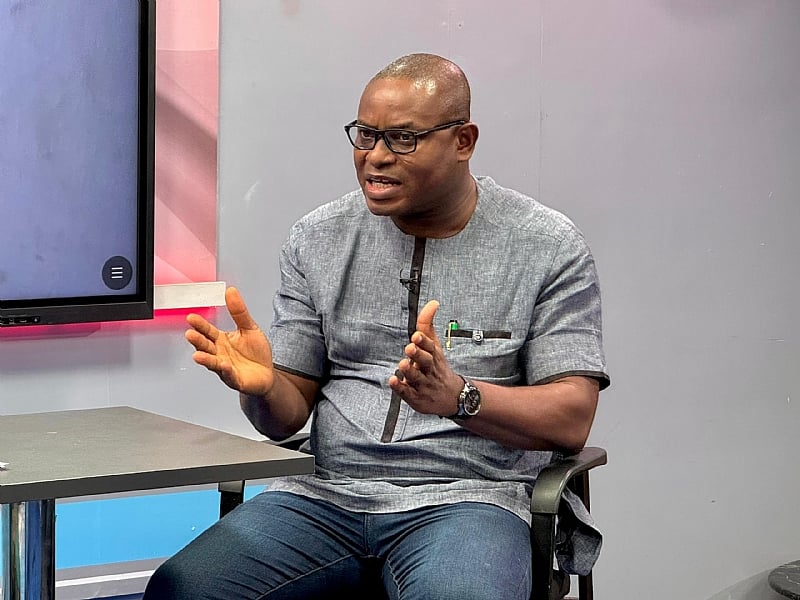The controversy surrounding the Ablekuma North parliamentary election deepened as Richard Ahiagbah, the Director of Communications for the New Patriotic Party (NPP), attributed Minority Chief Whip Frank Annoh-Dompreh’s incendiary remarks to the disruptive actions of National Democratic Congress (NDC) supporters. Annoh-Dompreh’s call for NPP supporters to engage in physical confrontation with NDC members during a visit to Ablekuma North sparked widespread condemnation. Ahiagbah, however, shifted the focus to the underlying issues hindering the election’s conclusion, arguing that the NDC’s actions created a volatile environment necessitating a strong response. He emphasized that addressing the root causes of the conflict, rather than solely focusing on Annoh-Dompreh’s statement, was crucial for resolving the situation.
Ahiagbah highlighted the NDC’s alleged obstruction of the Electoral Commission’s (EC) collation process as the primary reason for the delayed election results. He accused NDC supporters of actively disrupting the process, preventing the EC from completing its duties. Furthermore, he criticized the Inspector General of Police (IGP) for failing to provide adequate security for the election proceedings, despite a High Court directive. Ahiagbah contended that these disruptive actions, rather than Annoh-Dompreh’s words, should be the center of public discussion and concern. He suggested that the ongoing tensions in Ablekuma North warranted the attention of even the highest levels of government, including the president.
Ahiagbah pointed to a specific incident on January 17th, where NDC supporters allegedly vandalized property at the EC regional office, as further evidence of the party’s disruptive behavior. He argued that this act of violence, allegedly led by the NDC’s Greater Accra Regional Organiser, had been largely overlooked in the media’s coverage of the Ablekuma North election. Ahiagbah lamented the lack of attention given to the alleged vandalism, suggesting that focusing solely on Annoh-Dompreh’s comments while ignoring the NDC’s actions would be an “injustice to the issue.” He reiterated the importance of understanding the context surrounding Annoh-Dompreh’s statement, claiming that it was a response to the escalating tensions and provocations by the NDC.
The NPP communications director argued that the focus should be on resolving the underlying issues that led to the current impasse in Ablekuma North. He suggested that addressing the security concerns, ensuring the EC can complete its work without interference, and holding those responsible for the alleged vandalism accountable would create a more conducive environment for peaceful elections. Ahiagbah implied that Annoh-Dompreh’s controversial remarks were a symptom of the larger problem, and that resolving the root causes would eliminate the need for such inflammatory rhetoric. He stressed that focusing on the symptoms, rather than the underlying issues, would not lead to a lasting solution.
Ahiagbah’s defense of Annoh-Dompreh centered on the argument that the Minority Chief Whip’s words should not be taken out of context. He maintained that Annoh-Dompreh’s statement was a reaction to the perceived aggression from the NDC and the need to protect NPP supporters. While not explicitly condoning the call for violence, Ahiagbah suggested that understanding the circumstances surrounding the statement was crucial. He implied that the media’s focus on Annoh-Dompreh’s words diverted attention from the core issues – the alleged obstruction of the election process and the acts of violence attributed to the NDC.
In essence, Ahiagbah reframed the narrative surrounding the Ablekuma North election controversy. He shifted the blame from Annoh-Dompreh’s incendiary remarks to the alleged disruptive actions of the NDC. He argued that the focus should be on ensuring a peaceful and transparent election process, addressing the security concerns, and holding those responsible for violence accountable. By highlighting the alleged actions of the NDC, Ahiagbah attempted to contextualize Annoh-Dompreh’s statement, suggesting that it was a consequence of the escalating tensions created by the opposing party. He maintained that addressing the root causes of the conflict, rather than simply condemning the rhetoric, was the key to resolving the situation and ensuring free and fair elections in Ablekuma North.


